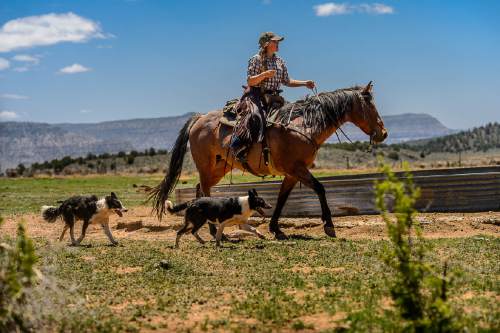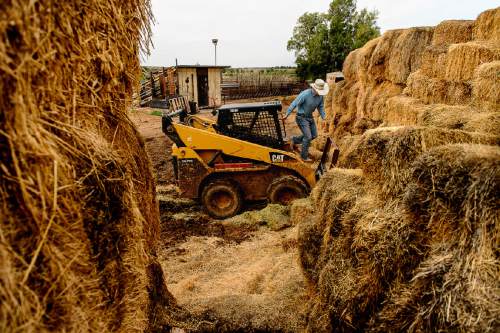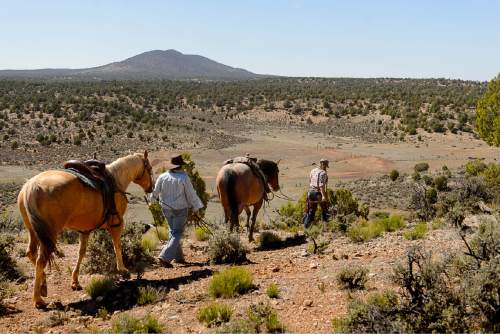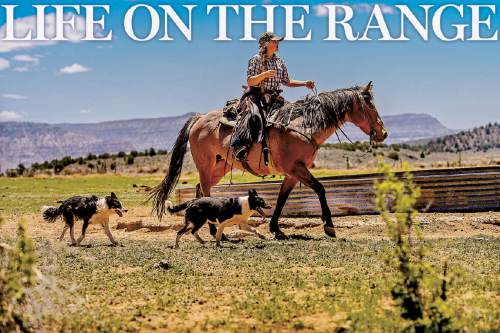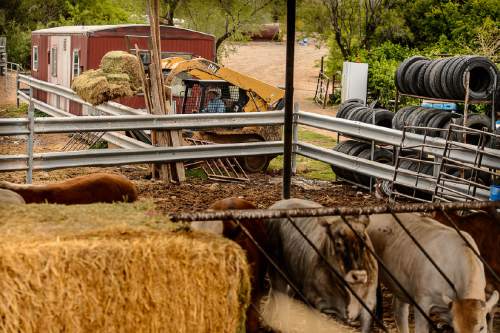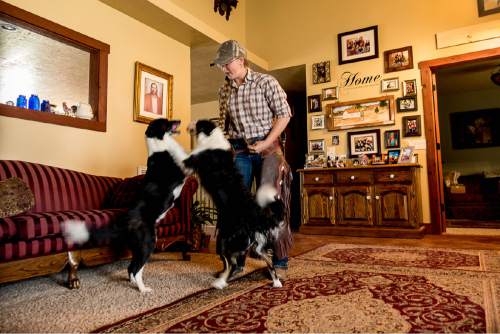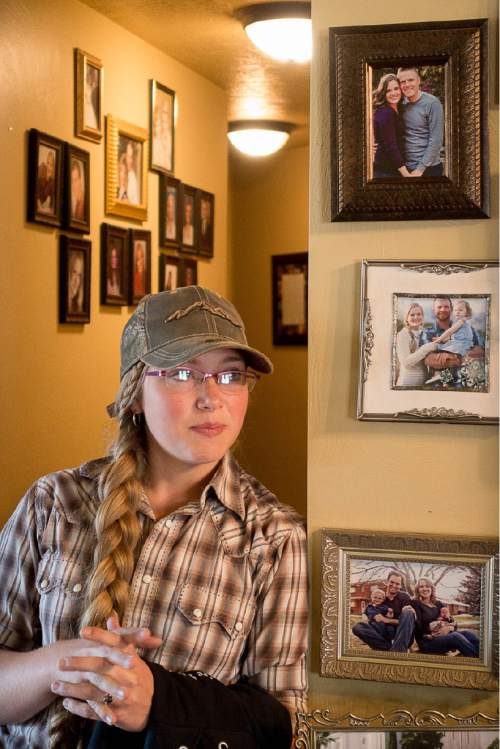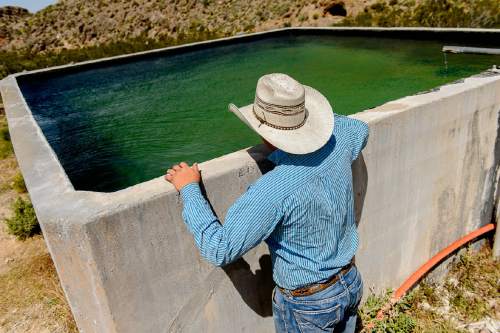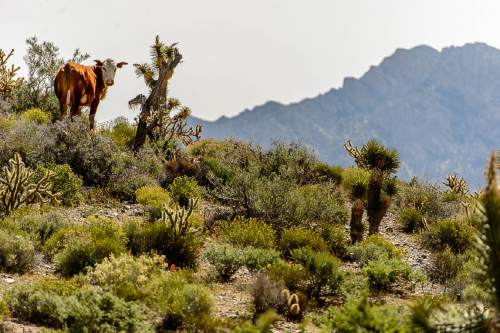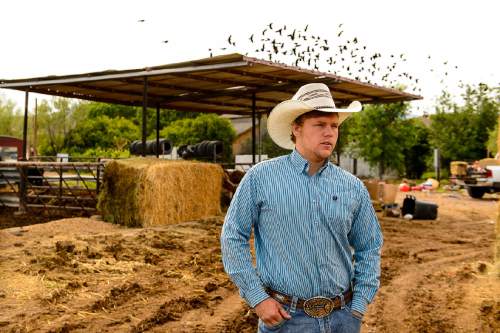This is an archived article that was published on sltrib.com in 2016, and information in the article may be outdated. It is provided only for personal research purposes and may not be reprinted.
Tuckup, Ariz. •
Her dust trail hems in five dozen cattle while Tean Finicum — pronounced Tee-Ann — rides behind them from flank to flank, driving the herd toward a dirt road that borders a low mountainside.
As her saddle-length blond braid bobs in step with her horse, the 18-year-old shouts over the wind to direct the movements of her mom, Jeanette. Together with two frantic border collies, they impress upon the cattle that the most convenient option is to mosey on forward while sneaking mouthfuls of the windswept grass.
Weekend adventurers on motorcycles and in SUVs wave as they pass on the road. "There are some real-live cowgirls back there," one will announce to the passengers of a car parked ahead.
After a few miles, Tean rides away from the herd while Jeanette continues to drawl "Heeey, cow" at its rear. She waits for them just beyond a cattle guard, demanding that they turn more than 90 degrees and begin to climb the mountain where the scrub is less dense.
They'd rather not. The last time Tean tried this, when she was by herself, the cattle refused. The whole effort, including a 45-mile drive south from the family's home near the Utah border in Cane Beds, Ariz., had been for nothing.
This time, the dogs scurry about to browbeat the grunting insubordinates as mother and daughter turn them toward slope and sky. The herd starts and stops, starts again and stops again. Finally, deprived of an easier choice, it heads unhurriedly toward the top, from which point memory alone will lead the cattle to the higher ground's water source.
The day's work has been a success, and the Finicums are pleased.
But even victories like these are inhibited by a recurring thought.
This was easier with Dad.
—
'I'm constantly working' • It was April 2014, while he was attending a conference in Salt Lake City, that LaVoy Finicum set himself down the path that would lead to his late-January death on a rural highway in eastern Oregon.
Reports of a standoff near Cliven Bundy's southeastern Nevada ranch compelled Finicum to ditch the conference and drive to meet Bundy, who invited Finicum to ride with him the next day. Little was written about Finicum's role in Bunkerville, but he later would become the de facto spokesman for the 41-day occupation of a federal wildlife refuge near Burns, Ore.
Those who believe the federal government's administration of public lands amounts to tyranny regard Finicum and Bundy as martyrs for their involvement at Bunkerville and Burns.
To those who don't, they were misguided at best, domestic terrorists at worst.
But to Tean Finicum and Arden Bundy, these men are Dad, painfully absent as the teens come of age on the rugged earth where their fathers taught them intertwining lessons about ranching and life.
Arden graduated early from Mesquite's Virgin Valley High so he could ranch full-time this spring. His days are bookended by 7 a.m. and 7 p.m. feedings of the 100 or so cattle kept on the family's homestead, a green swath of grass and melon farm sandwiched between the muddy Virgin River and rusty bench of Virgin Mountain.
Tean says her shortest days were 12 hours and her longest were 20 before she walked at graduation May 26 — four months to the day that news of her father's death spread while her family sat in the same gym to watch her play basketball.
It was her dream to one day take over the ranch, but not for another 10 years or so.
"I'm constantly working, everywhere I go."
Working, both Arden and Tean, without the blessing of their fathers' shared adversary: the federal government.
—
'Baby of the family' • Arden speaks with his hands up, as though conducting the steady, deliberate rhythm of his words.
"My dad never really told me, 'You're going to take care of the ranch,'" he says. "But I felt like I was the best fit."
He's stocky, powerful enough that in his first year wrestling, he reached the state quarterfinals at 220 pounds, and his belt buckle reads "All-Around Cowboy." He says he can teach you to rope in a morning.
Even if his four brothers weren't behind bars awaiting a February trial with his father, Arden says he was always likeliest to inherit the operation as the youngest Bundy, unburdened by other family and business obligations.
A dog seeks his attention while he talks, keeping the weight off its wounded front leg. Arden reckons that Spur, at 4, is getting old to be a cow dog, but he's seen him drag a coyote by the throat after it came for their chickens.
"He don't put up with that."
He expected to be arrested when he turned 18 at the end of March, and he says he was prepared to die in 2014. He likens their success retaking their cattle at a Bureau of Land Management impound site, when federal agents chose to stand down as both sides trained guns on the other, to when "a bunch of podunk farmers came together and kicked [British] ass."
"Something big is going to come out of this," he says. "If I stop ranching, there's no point in fighting."
At one point during his morning feed, Arden stops the loader to cast a skeptical eye at a helicopter passing overhead.
But as much as his performance recalls the seriousness and bravado of his father's public appearances, he is still the "baby of the family," says his mom, Carol. A teenager.
"He still wants to stay out late and hang out with his friends," she says. He enjoys Snapchat and ribbing family security guard Jonathon "Skipper" Speece. This year, he took dates to three different proms, and after he leads reporters on a tour of the mountain, he talks on the phone about a custom bumper for his truck and later will post a photo of it to Instagram.
His friends from school, who know little about ranching, think his lifestyle is a "rotten deal," he says. And, sometimes, he agrees.
Speece says Cliven's arrest at a Portland airport in early February — days after he'd attended Finicum's Kanab funeral with Arden by his side — took a toll on Arden. The teenager no longer wakes up to find his father reading scriptures, or preparing "crazy-looking" breakfasts that always included meat, potatoes and Tabasco. Most days now, he works alone. But he remains faithful to his father's philosophy.
He points the way to a spring that he calls Rabbit (on Google Earth, it's Government Spring), where he snaps some buds off a small bush and rubs them between his fingers to create a powerful fragrance. Grazing replenishes this vegetation, he says. Without the cattle, he says, it would die.
When a cow shepherds her calves away from a passing car, Arden says their recent birth is proof the cattle have everything they need to survive. "They're happy," he says, or else they wouldn't have bred.
Federal prosecutors have deemed the Bundys' ranching methods "unconventional if not bizarre." The cattle aren't vaccinated. They're rarely branded. Some wander as far as 50 miles from the Bundy estate, onto golf courses and Interstate 15, until they're trapped by bait for sale or slaughter.
This draws an eyeroll from Arden.
Carol Bundy — speaking beneath a painting in which her husband holds an American flag in his outstretched right arm, his hat held across his chest as he bows his head reverently — says their way of ranching is in line with "the custom and the culture of the West."
"They're wild. That's what I raise. Wild cows. But that doesn't make them bad. That doesn't make me bad."
—
'He was just a sweet man' • Jeanette Finicum met LaVoy at a St. George barn dance, where dancers changed partners each time a bell rang. When the music stopped, she was with LaVoy.
He told her he'd gotten a flat and had to hike to the dance, and asked her for a ride. She had thought it might be a line, but, truly, he'd had a flat.
"I instantly was attracted to him," she said. "He was just a sweet man. Very polite. Very kind."
That was 1992. By 1993, they were married, living in a small white house surrounded by a redrock panorama on the Finicum family's Cane Beds homestead. Together they had nine children from previous marriages — though four lived in Provo with LaVoy's first wife — and they added two more with Tean and an adopted boy, Mitch.
LaVoy had designed his LV bar brand, now synonymous with the broader movement, when he was only 8, but jobs in foster care took them to Albuquerque, N.M., and Paulden, Ariz., before he ever owned a ranch.
They returned to Cane Beds in 2010, when they purchased 20 head and took over a BLM grazing permit 45 miles south that was in the name of LaVoy's father, David.
These 17,000 acres, named Tuckup, are marked by dramatic elevation change, from desert shrubland to green high country, about a dozen miles north of the Grand Canyon's Toroweap Outlook.
The sunbaked Arizona Strip was long considered uninhabitable by white explorers until it was settled by Mormon ranchers in the latter half of the 19th century. Eventually, it became home to 100,000 cattle, as well as untold sheep. Today, the BLM permits 15,000 cattle, and no sheep, and it claims good relationships with its permit holders on the Strip.
All except one. Last August, the BLM says it discovered Finicum's cattle at Tuckup two months earlier than his permit allows. He was directed to settle the matter at his local office, but the cattle continued to graze until October, when he was found to be in willful trespass and fined $12,000.
Jeanette says it wasn't an act of disobedience but a standard practice — "not a big deal" — that got them punished. She believes they were under the microscope after her husband had decried federal oversight of public lands while touting his novel about a survivalist patriarch who defends his family from corrupt government in an end-times scenario.
In April, Arizona Strip District Manager Timothy Burke said he had yet to talk to the Finicums, delaying because "it is a very difficult situation."
Now, the Finicums' permitted season has expired, the cattle remain, and the fine still is unpaid. "We're pretty much keeping them here year-round now," says Jeanette, who adds that she received a call from the BLM the week prior. She has hired an attorney, she says, but she hasn't made any final decisions about what to do next.
Burke's office said in a statement at the end of May that it is "working through a standard administrative process to find a resolution to this issue."
The Bundys, meanwhile, are a more pressing concern for the BLM. Conservation groups say their cattle still imperil the desert tortoise, and Nevada Sen. Harry Reid says the Bundys have damaged Joshua trees — abundant on the Gold Butte landscape, where bright flowers dot vegetation that has an otherwise surreally ancient appearance.
The BLM contracted with Utah companies for its ill-fated roundup and sale of Bundy's cattle in 2014, leading to a picket of the R Livestock Connection in Monroe and opposition from Utah lawmakers and county law enforcers.
BLM Southern District acting District Manager Erick Kurkowski said in an email to The Salt Lake Tribune that there "are no plans for a gather at this time as we continue to cooperate with the Department of Justice on the ongoing legal matter."
Speece, meanwhile, waits at the ready to call for help if the BLM returns. Arden believes that if the feds try again, more than 1,000 supporters will join him in opposition.
"It'd be a repeat of 2014."
—
'Until I get home, it's your job' • The Bundys are old hands at this, having defied the federal government since Cliven decided not to renew his grazing permit in 1993.
For the Finicums, this is new.
On New Year's Eve 2015, they camped at Tuckup after a day of gathering and branding. Jeanette, LaVoy and son Thomas slept inside a tent, while Tean curled up outside with a puppy in her sleeping bag to keep warm.
The next day, when they got home, LaVoy got a call.
"Sure, I'll go," they heard him say. "I can drive. I've got my new truck."
Taking with him the clothes he had on and, presumably, the bugout bag with food, water and an extra set of clothes that he had in case of a flat, he left for eastern Oregon to protest the return to prison of ranchers Dwight and Steven Hammond, ordered to serve the remainder of mandatory minimum sentences for setting fires on public lands.
He'd just bought Jeanette a new horse, a jacket to match his own, a slicker and a cap. They were about to become empty-nesters, and he figured they'd spend more time out at Tuckup.
"It was going to be our life," Jeanette says. "We were just at the point where we could retire in a few years from doing foster care and just run the ranch."
Wife and daughter say they believed he would come back after the protest in Burns. They knew nothing of plans to occupy the nearby bird refuge, though they would visit. He hoped they'd stay, but his brother Guy convinced him that it was best if they returned to Cane Beds.
Finicum's parting plea with Tean was for her to take care of the ranch.
"You know what to do," he said. "Until I get home, it's your job."
They learned of his death at Fredonia High when Jeanette received a call from the wife of Ammon Bundy, Lisa, who was "screaming and crying and yelling over and over again that they killed LaVoy," Jeanette says.
They still were trying to verify Lisa's report hours later, but police and hospital staff wouldn't confirm it — still a sore spot for Jeanette.
"That was pretty tough. We soon learned we had to get another layer of skin. A few layers."
They've since encountered people who'd like them to push their own agendas, she says, and seen reports that they say are factually inaccurate. But they've had support, too. About 70 people greeted Jeanette when she brought home the body for burial. Guests painted the Finicums' chicken coop, tilled their garden and planted crops. A pile of letters sits at the foot of their couch, and Jeanette unfolds a sketch of her husband with the words, "The salt of the Earth that did not lose its savor."
Earlier this spring, Arden Bundy came to help rope cattle and stayed for a night of games that reminded the Finicums of happier times, when the family gathered to fiercely compete over Rook, Dominion and Settlers of Catan.
This day, a whistling wind fills the silences, and Tean sits quietly as her mother talks, occasionally correcting small details about her childhood.
Her father put her on a horse at 2, Jeanette says. At 12, she saved $800 to buy her own cow, and she was taught to apply a brand, clip the ears and castrate young bulls. She home-schooled while she was in elementary school so she could help her father scout available ranches, and later again in high school so she could join him at work.
"I've always been his right-hand man, from the beginning," she says.
Now, caring for the cattle that her father prized is both a reminder of his love and his absence.
"The ranch, I guess, was more something I did because I loved him," she says, "and I loved to spend time with him."
mpiper@sltrib.com, Twitter: @matthew_piper —
Post-standoff status
Three dozen people were indicted for their roles in standoffs with federal employees in southeastern Nevada and eastern Oregon.
In April 2014, after the BLM impounded about 400 of Cliven Bundy's cattle to fulfill a court order that stemmed from decades of noncompliance with BLM grazing policy, the feds released Bundy's cattle after a tense standoff in which each side trained weapons on the other.
Among the 19 charged with felonies related to those events are Bundy himself and his sons Ammon, Ryan, Melvin and David.
The trial is set for February.
Ammon and Ryan also are among 27 charged with felonies relating to a 41-day occupation of the Malheur National Wildlife Refuge in eastern Oregon.
The trial is set for September.
The occupation began Jan. 2 after a protest in nearby Burns, Ore., over the ordered return to prison of ranchers Dwight and Steven Hammond to fulfill mandatory minimum sentences for fires they set on public lands.
Oregon state police shot and killed Arizona Strip rancher LaVoy Finicum on Jan. 26 on a rural highway after Finicum veered his truck into a snowbank to avoid a roadblock. After exiting the vehicle, overhead footage appears to show him reaching toward his jacket, where police later found a handgun. He was 54.
An investigation later found the shooting of Finicum to be justified, though the Department of Justice launched a separate investigation into two shots fired by FBI agents as Finicum was exiting his truck, before he reached toward his jacket. —
Bunkerville vs. Bundyville
The Finicums' Tuckup allotment, which runs through May 2019 and for which they most recently paid an annual fee of $1,100 in 2014, is a half-dozen miles from the small Arizona Strip town homesteaded by Cliven Bundy's great-grandfather, Abraham, during World War I.
A converted Mormon, Abraham Bundy was driven from Nebraska by flood and Mexico by revolution when he founded Mount Trumbull, which became known as Bundyville.
Bundyville was home to as many as 250 residents at its peak during the 1930s, according to the BLM.
Ultimately, the Taylor Grazing Act of 1934 led to the slow demise of the town, with the last full-time resident leaving in 1984.
Bundys still graze cattle in the area, however, doing so in compliance with their BLM permits. In 2001, the Bundy family worked with the BLM to restore the town's historic white schoolhouse after it was burned by arsonists. They only know the Finicums from the news, and Jeanette and Tean Finicum were unaware of their neighbors' relation to the Bunkerville, Nev., ranchers.


